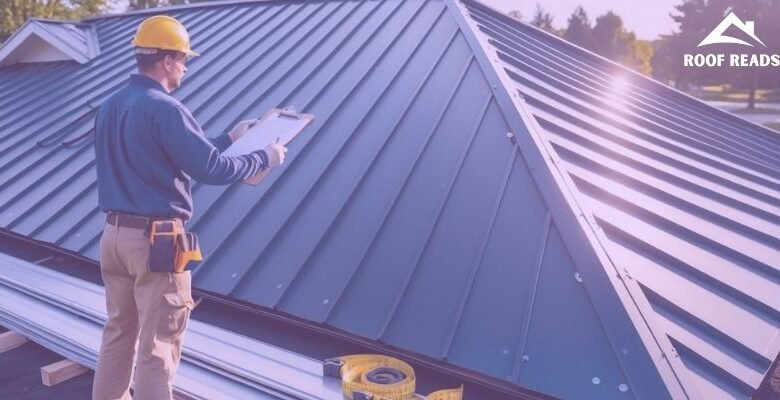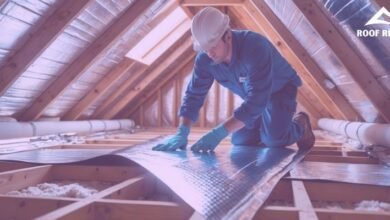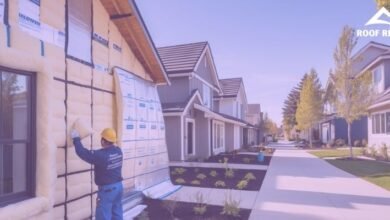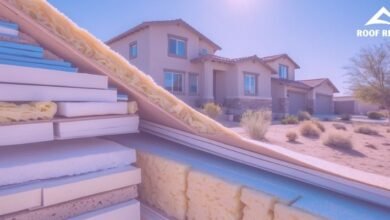How Much Does a Metal Roof Cost: A Comprehensive Price Guide for Homeowners

Metal roofing has become increasingly popular for homeowners looking for durability and style. When considering this upgrade for your home, cost is often the first question that comes to mind. Metal roofing typically costs between $7 and $29 per square foot installed, with most homeowners spending around $11,450 to $27,500 for a complete roof installation on a standard 1,700-2,000 square foot home.
The price varies widely based on several factors. Different metal types offer various price points – aluminum might cost $4-$11 per square foot, while copper can reach $15-$30 per square foot. The complexity of your roof design, your location, and labor costs in your area also play significant roles in determining the final price.
While metal roofing represents a higher upfront investment compared to traditional asphalt shingles, many homeowners find the longevity and reduced maintenance costs worthwhile. Metal roofs can last 40-70 years, significantly longer than conventional roofing materials, making them a long-term investment for your home.
Key Takeaways
- Metal roof costs range from $7-$29 per square foot installed, with total costs averaging $11,450-$27,500 for a typical home.
- Material choice dramatically affects pricing, with aluminum being most affordable and copper commanding premium prices.
- The initial investment is higher than traditional roofing but provides better longevity, energy efficiency, and reduced maintenance costs over time.
Average Metal Roof Cost Breakdown

Metal roofing costs vary based on several factors including materials, labor, and location. Understanding these costs helps homeowners budget appropriately for their roofing project.
National Average Prices
The national average cost for a metal roof installation ranges from $10,425 to $40,000 for a typical home. Most homeowners spend between $11.50 and $20.50 per square foot for a complete metal roof system.
Price ranges differ significantly based on the type of metal chosen. Standing seam metal roofs cost between $10 to $16 per square foot, while corrugated metal options run from $7 to $12 per square foot.
Regional factors impact these prices too. Coastal areas or regions with extreme weather conditions may see higher installation costs due to specialized requirements. Urban locations typically have higher labor costs than rural areas.
Homewyse estimates suggest most complete metal roof installations fall between $20,000 to $40,000 for a 2,000-square-foot home.
Cost Per Square Foot
Metal roofing materials range from $8 to $16 per square foot on average in 2024. This price varies based on the specific metal type and profile selected.
Aluminum and steel represent the more affordable options at $8-$12 per square foot. Copper and zinc sit at the premium end, often exceeding $20 per square foot.
The roof’s complexity also affects square footage pricing. Simple gable roofs cost less to cover than complex designs with multiple angles, valleys, and penetrations.
Metal Roofing Cost Per Square Foot:
- Corrugated metal: $7-$12
- Standing seam: $10-$16
- Metal shingles: $10-$14
- Premium metals (copper/zinc): $20+
These square footage costs typically include both materials and standard installation labor.
Labor Versus Material Expenses
Labor typically represents 50-60% of the total metal roof cost. Professional installation ranges from $5 to $10 per square foot, depending on roof complexity and local labor rates.
Material costs make up the remaining 40-50% of the project budget. Basic metal panels might cost $3-$6 per square foot, while premium metals can exceed $10 per square foot for materials alone.
Additional components increase material expenses:
- Underlayment
- Fasteners and clips
- Flashing and trim
- Ridge caps
- Vents and penetration boots
Roof removal adds $1-$3 per square foot if old roofing needs to be torn off. Some installations require structural reinforcement, which further increases labor costs.
Many roofing contractors offer cost estimates that break down labor versus materials. Getting multiple quotes helps homeowners understand the fair market price in their area.
Key Factors Affecting Metal Roof Pricing

When budgeting for a metal roof, several elements impact the final price tag. Understanding these factors helps you plan accurately and avoid surprise costs.
Roof Size and Complexity
The square footage of your roof directly affects material quantities and labor time. Most roofing contractors measure in “squares,” with one square equaling 100 square feet.
A typical 2,000 square foot home might have a roof area of 2,200-2,600 square feet, depending on pitch and design. According to recent data, metal roofing costs between $8 and $16 per square foot in 2024-2025.
Roof complexity adds significant cost. Features like valleys, dormers, chimneys, and skylights require extra material and labor. Each cut, bend, and flashing adds time to the installation process.
Steep pitches also increase costs by 15-25% due to additional safety equipment and slower installation times. A simple gable roof is less expensive than a complex hip roof with multiple angles.
Type of Metal Roofing Materials
Metal roofing comes in various materials, each with different price points:
| Material | Cost Per Square (100 sq ft) | Durability |
|---|---|---|
| Aluminum | $390-$600 | 40-50 years |
| Steel | $350-$900 | 40-70 years |
| Copper | $1,800-$2,300 | 70+ years |
| Zinc | $1,000-$1,800 | 80+ years |
Standing seam metal roofs cost $10-$16 per square foot and feature concealed fasteners for a cleaner look and better weather protection. These systems typically last 50+ years.
Corrugated or ribbed panels run cheaper at $7-$12 per square foot. While more affordable, they use exposed fasteners that may require maintenance over time.
Metal thickness (gauge) also impacts pricing. Thicker metals cost more but provide better durability and noise reduction.
Comparing Metal Roofing Options and Alternatives
Metal roofing comes in several styles with different price points and benefits. Understanding these options helps homeowners make informed decisions based on their budget, climate, and aesthetic preferences.
Standing Seam vs. Exposed Fastener Systems
Standing seam metal roofs cost between $8-$16 per square foot installed. They feature concealed fasteners with raised seams that connect panels, creating a sleek appearance. These systems last 40-60 years and resist leaking because no fasteners penetrate the metal surface.
Exposed fastener systems are more affordable at $5-$8 per square foot installed. These panels attach directly to the roof deck with screws or nails that remain visible.
While less expensive initially, exposed fastener systems may require maintenance after 15-20 years as the fasteners can loosen or deteriorate. They may need replacement or tightening to prevent leaks.
Durability Comparison:
- Standing seam: 40-60 years
- Exposed fastener: 20-30 years
Metal Roofs vs. Asphalt Shingles
Metal roofing costs $8-$16 per square foot installed compared to asphalt shingles at $3-$5 per square foot. Despite the higher upfront cost, metal offers better long-term value.
Asphalt shingles typically last 15-25 years, while metal roofs last 40-70 years depending on the material and installation quality. According to industry data, asphalt roofing offers a higher immediate resale value (61.1%) than standing-seam metal roofs (48.9%).
Metal roofing is more energy-efficient, reflecting solar radiation instead of absorbing it. This can reduce cooling costs by 10-25% in summer months. Metal roofs also:
- Withstand high winds (up to 140 mph)
- Resist fire, mildew, and insects
- Require minimal maintenance
- Can be installed over existing roofs in some cases
Asphalt shingles offer easier installation and repair, plus they create less noise during rain and hailstorms.
Additional Expenses To Consider
When budgeting for a metal roof, the base material and labor costs are just the beginning. Several other financial factors can significantly impact your total investment and should be included in your planning process.
Underlayment and Accessories
A quality metal roof requires proper underlayment to function correctly. Synthetic underlayment typically costs $0.25 to $0.50 per square foot, while premium options like self-adhering ice and water shield may cost $0.75 to $1.00 per square foot.
Metal roof accessories also add to the total price:
- Ridge caps: $2 to $5 per linear foot
- Drip edge: $1 to $3 per linear foot
- Fasteners and clips: $50 to $200 total
- Flashing for chimneys and vents: $5 to $15 per linear foot
- Snow guards: $3 to $8 per linear foot (important in snowy regions)
These components are essential for proper installation and roof longevity. Skimping on quality underlayment or accessories can lead to performance issues and potentially void warranties.
Permits and Building Codes
Most localities require building permits for roof installations, which typically cost $250 to $500 depending on your location. Some areas may charge based on project value, usually 1-3% of the total cost.
Building code compliance might necessitate:
- Structural reinforcement if switching from lightweight to heavier metal ($1,000-$5,000)
- Updated insulation to meet energy codes ($1-$2 per square foot)
- Special fastening systems in high-wind areas ($1-$3 per square foot additional)
Homes in historic districts may face stricter requirements, potentially increasing costs by 10-20%. Always check local regulations before beginning your project to avoid costly corrections later.
Sales Tax and Regional Differences
Sales tax varies significantly by location, ranging from 0% in some states to over 9% in others. On a $15,000 metal roof, this difference could mean paying up to $1,350 in additional taxes.
Regional factors affecting metal roof costs include:
- Climate considerations (snow load requirements in northern states)
- Local labor rates (metropolitan areas typically charge 20-30% more)
- Material shipping costs (remote locations face higher delivery fees)
- Seasonal pricing (installation during off-peak seasons may save 5-10%)
Some states offer tax incentives for energy-efficient roofing materials. Metal roofs with ENERGY STAR certification may qualify for rebates or tax credits, potentially offsetting some costs. Check with local tax authorities about available programs.
Installation Process and Hiring Professionals
Installing a metal roof requires specialized skills and equipment. The process involves several steps from tear-off of the old roof to final inspection, and typically takes 1-3 days for residential projects depending on roof size and complexity.
Working with Roofing Contractors
When selecting roofing contractors for a metal roof installation, look for specialists with specific metal roofing experience. Request proof of insurance, licenses, and references from past metal roof projects.
Most professional installers offer warranties on their workmanship (typically 5-10 years) in addition to the manufacturer’s material warranty. This protects homeowners from installation errors that might cause leaks or performance issues.
Many metal roof specialists provide free consultations and estimates. During these meetings, contractors should examine the roof structure, discuss ventilation needs, and address any concerns about the existing roof deck.
Always get at least three quotes to compare pricing, materials, and project timelines. The lowest bid isn’t always the best choice if it sacrifices quality or proper installation techniques.
Project Supervision and General Contractors
A general contractor may oversee roof installation as part of a larger renovation project. They coordinate schedules, manage permits, and ensure code compliance while supervising the roofing team.
The general contractor serves as the main point of contact, handling communication between homeowners and specialized roofing crews. This arrangement can simplify the process but may add 10-20% to overall costs.
Supervision ensures that crucial details aren’t overlooked, such as proper flashing installation, underlayment application, and ventilation requirements. These elements are essential for a metal roof’s longevity and performance.
For complex roofing projects involving multiple building systems, having a general contractor can help coordinate work between roofers, electricians, and other trades that might impact the roof.
Labor Costs and Local Availability
Labor typically accounts for 60-70% of total metal roof installation costs. Rates vary by region, with metropolitan areas generally charging more than rural locations. Average labor costs range from $3-7 per square foot.
Local labor shortages in the construction industry have impacted roofing projects across the country. In high-demand areas, this can lead to longer wait times (sometimes 2-3 months) and higher costs.
Seasonal factors affect labor availability and pricing. Many roofing contractors are busiest during summer and fall, with potential discounts available during winter months in some regions.
The complexity of a roof design significantly impacts labor costs. Steep slopes, multiple levels, skylights, and chimneys require more installation time and specialized safety equipment, increasing overall project expenses.
Energy Efficiency and Long-Term Value
Metal roofing delivers significant energy savings while providing exceptional durability that increases home value over time. These benefits help offset the higher initial installation costs.
Energy-Efficient Materials and Savings
Metal roofs reflect solar heat instead of absorbing it, reducing cooling costs by 10-25% during summer months. Many metal roofing products feature special reflective coatings that meet ENERGY STAR® requirements.
The energy efficiency comes from two key properties:
- Solar reflectance: Metal reflects sunlight rather than absorbing heat
- Thermal emittance: The ability to release absorbed heat quickly
These properties create what’s known as the “cool roof effect.” Homeowners in hot climates typically see the most dramatic savings, but even those in mixed climates benefit from reduced energy consumption.
Some metal roofing can be installed directly over existing roofing, adding another layer of insulation. This installation method also reduces landfill waste from tear-offs.
Lifespan and Maintenance Considerations
Metal roofs typically last 40-70 years compared to 15-30 years for asphalt shingles. This extended lifespan translates to significant long-term value despite higher upfront costs.
Maintenance requirements for metal roofing are minimal:
- Periodic inspections (once or twice yearly)
- Clearing debris from valleys and gutters
- Checking for loose fasteners
Most metal roofs need only occasional washing to maintain appearance. They resist issues that plague other materials:
- Won’t crack or curl like asphalt
- Resistant to mold and mildew growth
- Impervious to insect damage
Homes with metal roofs often command higher resale values due to these durability advantages. Buyers recognize the value of not needing a roof replacement for decades.
Insurance companies sometimes offer discounts for metal roofing due to its fire resistance and durability against weather extremes.
Frequently Asked Questions
Metal roof costs depend on several factors including materials, square footage, and installation complexity. These common questions address the most important pricing details homeowners need to understand before making this investment.
What is the estimated cost range for installing a metal roof on a residential property?
Metal roofing typically costs between $8 and $16 per square foot installed. This price range includes both materials and professional installation costs.
For most residential properties, homeowners should budget between $25,000 and $150,000 for a complete metal roof installation. Premium materials like copper significantly increase costs compared to standard metal options.
Material costs alone often represent two-thirds of the total project expense, with labor making up the remainder.
How do metal roofing costs vary by square footage?
A 2,000-square-foot home typically requires a metal roof investment ranging from $25,000 to $150,000 depending on material selection and roof complexity.
For comparison, the average 1,700-square-foot roof costs approximately $22,917 to cover with metal roofing materials.
Larger homes naturally require more materials and labor, increasing overall costs proportionally with square footage.
What factors influence the total price of a metal roofing installation?
Material selection creates the most significant price variation, with options ranging from economical steel to premium copper or zinc.
Roof complexity, including pitch, valleys, dormers, and chimneys, increases labor requirements and installation time.
Geographic location affects both material shipping costs and local labor rates, creating regional price differences.
Removal of existing roofing materials adds disposal fees and additional labor expenses to the total project cost.
Can the lifespan of a metal roof justify its initial installation cost?
Metal roofs typically last 30 to 50+ years, which is 2 to 3 times longer than traditional asphalt shingle roofs.
This extended lifespan creates substantial long-term savings by eliminating multiple replacement cycles required with shorter-lived roofing materials.
Metal roofing’s durability often provides better cost-benefit ratios compared to shingles, shakes, slate, or tile options when calculated over the roof’s entire lifespan.
What are the potential costs for replacing an existing roof with a metal one?
Replacing an existing roof involves removal expenses ranging from $1 to $5 per square foot depending on the current material and complexity.
Additional structural reinforcement may be necessary for some homes, particularly when switching from lightweight materials to heavier metal options.
Disposal fees vary by location but typically add several hundred dollars to the project cost depending on the volume of waste generated.
How can homeowners calculate the anticipated expense for a metal roof?
Start by measuring the roof’s square footage, then multiply by the appropriate price range ($8-$16 per square foot) based on your preferred metal type.
Add 10-15% to account for waste, overlap, and irregular shapes that require additional materials.
Request multiple detailed quotes from reputable contractors that break down material costs, labor expenses, and additional fees for a comprehensive estimate.
Consider timing your project during off-peak seasons when contractors may offer competitive pricing due to reduced demand.




